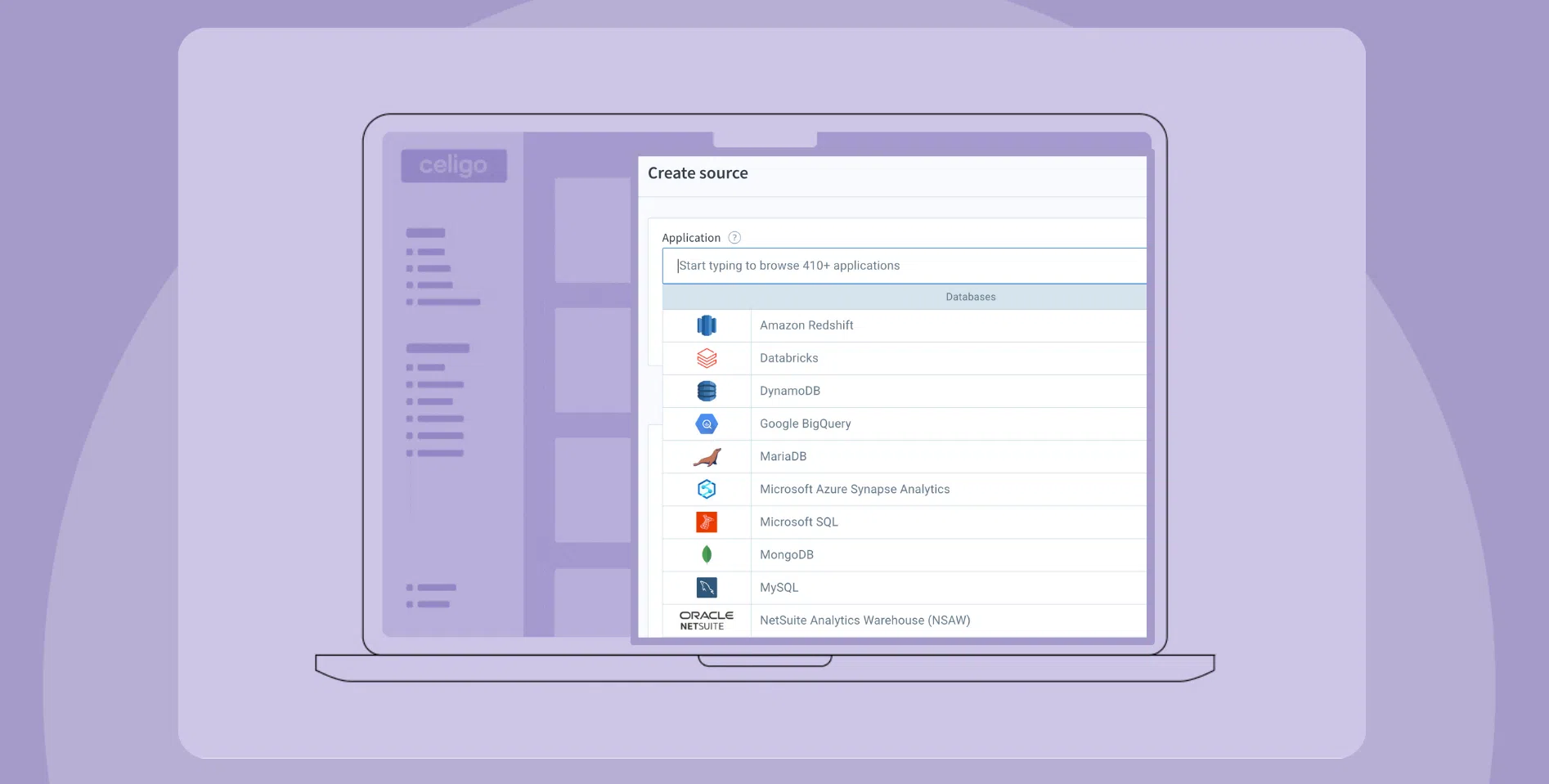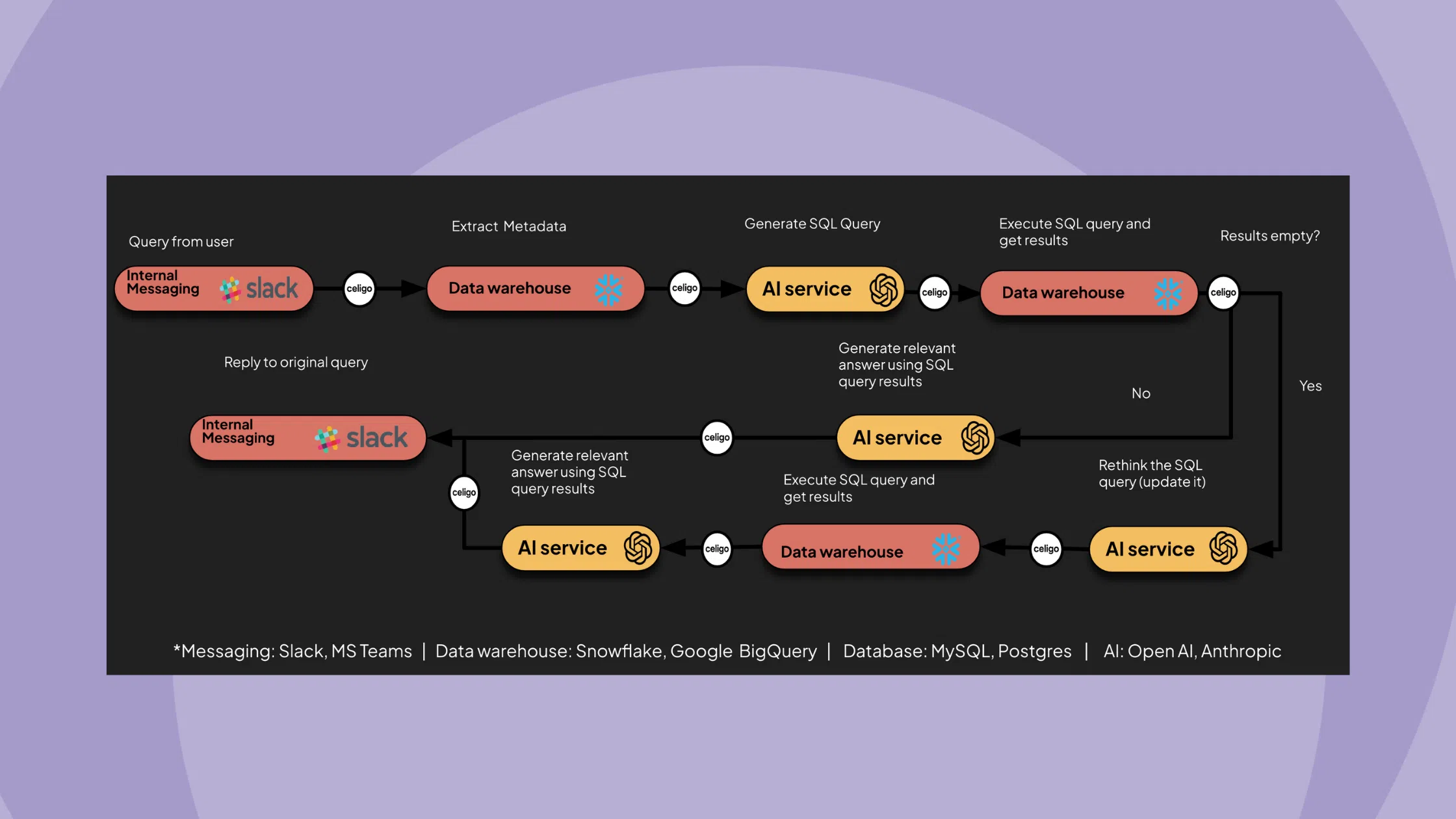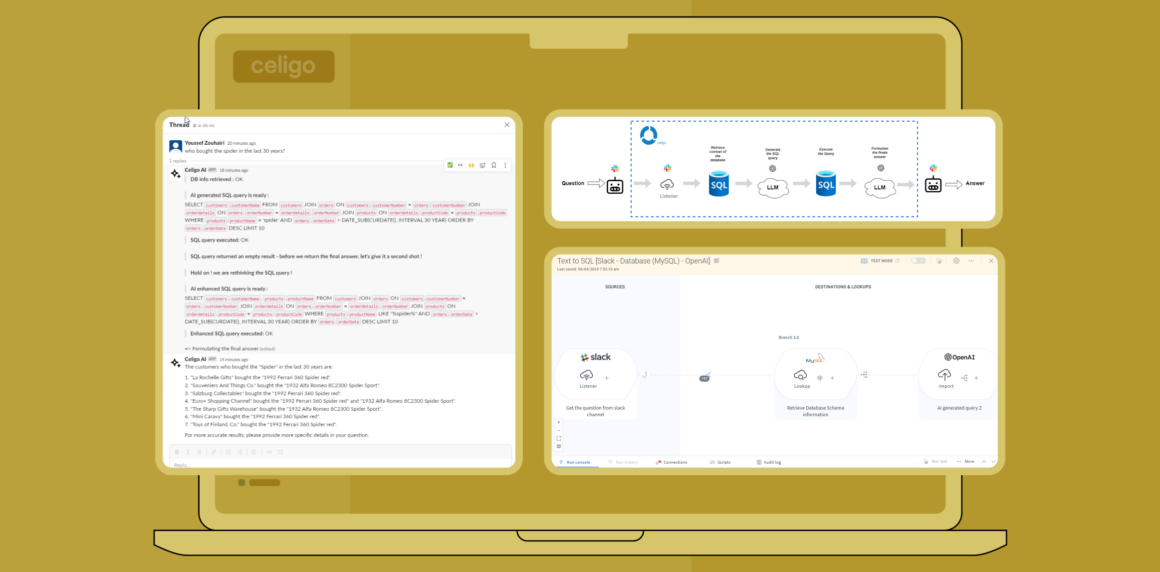Published Aug 21, 2024
AI use cases and benefits of iPaaS integration

For your AI strategy to be effective, it must seamlessly integrate with your data. Whether you’re developing an AI agent to act on insights from a large language model (LLM), refining AI models with enterprise data, or building a robust retrieval-augmented generation (RAG) system that utilizes your custom knowledge base — effective integration is key.
An iPaaS provides the necessary infrastructure to connect and optimize the use of AI technologies within an organization. Celigo’s advanced iPaaS connects AI tools, LLMs, and data sources seamlessly, enabling advanced capabilities that enhance decision-making, streamline operations, and improve customer experiences.
Let’s dive into several AI business use cases and explore the benefits of each.
AI-processed data
An iPaaS enables AI-processed data by integrating multiple data sources across different systems, allowing organizations to deliver consistent, normalized data to AI models. This integration ensures high-quality data inputs for analysis, making it easier for AI to perform tasks like sentiment analysis and data summarization.
Additionally, an iPaaS streamlines data flows, enhancing the efficiency and accuracy of AI-driven insights.
- Revenue operations (RevOps): Summarize key points from chat or call transcripts and distill long-form materials into concise content, enabling quicker and more informed decisions.
- Human resources (HR): Automatically scan resumes for relevant keywords, highlight top candidates, and analyze employee feedback to identify common themes.
- DevOps: Quickly resolve issues by summarizing incident reports and log files, providing essential insights without sifting through extensive data.
- Finance: Generate concise insights from complex financial reports, making it easier for teams to act on critical financial information.
- Customer service: Identify recurring themes in customer feedback and summarize issues and resolutions in ticket systems, improving future support.
Benefits:
- Time-saving summaries: Rapidly extract key points from lengthy data sets.
- Improved actionability: Make informed decisions based on machine-generated insights.
- Better customer understanding: Gain deeper insights into customer interactions for enhanced service.
Retrieval-augmented generation (RAG)
Leverage RAG systems to generate highly relevant and contextually accurate responses by integrating LLMs with your organization’s proprietary knowledge base.
By combining the general knowledge of LLMs with the specificity of a company’s internal data, RAG enables the generation of accurate, context-specific responses. Robust data transformation and real-time orchestration further enhance the accuracy and reliability of AI outputs, effectively overcoming the inherent limitations of LLMs.
Create a RAG application and overcome LLM limitations →
- Customer support: Enhance customer service by integrating with internal knowledge bases to deliver accurate and context-rich responses to customer inquiries. This improves resolution times and overall satisfaction.
- Internal communications: Facilitate easy access to essential information stored in company databases and communication tools like Slack to boost employee productivity. Employees can quickly retrieve the data they need, reducing downtime.
- Sales and marketing: Personalize customer interactions by generating content tailored to historical data and customer preferences, leading to higher engagement and conversion rates.
Benefits:
- Contextual accuracy: Ensure responses are grounded in both external data and internal expertise.
- Enhanced relevance: Provide answers tailored to your organization’s specific needs and information.
- Improved decision-making: Quickly access accurate, context-aware information to support strategic decisions.
Automated response generation
Generate automated, human-like responses for customer support, emails, and social media using AI. This automation enables your organization to efficiently handle a higher volume of interactions while maintaining consistent messaging.
It also frees up your team to focus on more complex and high-value tasks.
- Customer support: Automatically generate responses to frequently asked questions, ensuring quick, consistent, and accurate replies.
- Social media engagement: Respond to common comments and questions on social media platforms, enhancing customer interaction without manual intervention.
- Sales and marketing: Drive engagement with potential leads through automated follow-up emails and real-time chat responses, improving customer experience and conversion rates.
- DevOps: Automate deployment notifications to keep teams informed about software releases and updates, ensuring smooth operations.
Benefits:
- Consistent messaging: Maintain uniform responses across all platforms.
- Increased efficiency: Handle a higher volume of interactions quickly and effectively.
- Free up human resources: Allow teams to focus on more complex issues that require human insight.
Predictive analytics
Utilizing iPaaS, organizations can efficiently integrate data from multiple sources, standardize it, and feed it into AI models. This process enhances the accuracy of historical analyses and forecasts, enabling the generation of critical insights that inform strategic business decisions.
By streamlining data integration and preparation, an iPaaS empowers businesses to leverage AI for more precise predictions and proactive management.
- Inventory management: Predict future inventory needs to optimize stock levels, reduce costs, and prevent stockouts.
- Supply chain optimization: Foresee supply chain disruptions and adjust procurement strategies to maintain smooth operations.
- Customer lifetime value (CLV) prediction: Identify high-value customers and tailor marketing efforts to maximize retention.
- Risk management: Predict financial or operational risks and develop mitigation strategies to address them proactively.
Benefits:
- Proactive decision-making: Anticipate future challenges and take action before issues arise.
- Optimized operations: Align inventory and supply chain management with predictive insights for greater efficiency.
- Enhanced customer targeting: Increase marketing effectiveness by predicting customer behavior and segmenting audiences.
- Reduced risk: Mitigate risks with data-driven strategies, leading to more stable business operations.
Natural language BI
Previously, accessing complex datasets required data and BI analysts to write and execute SQL queries. By allowing users to query databases and data warehouses using natural language, organizations can democratize data access.
This capability enables employees across all departments to gain valuable insights without needing deep technical knowledge, thereby enhancing decision-making and operational efficiency.
Enhance data accessibility with AI and natural language BI →
- Customer analysis chatbots: Integrate AI to create chatbots that provide detailed insights into product usage and customer behavior. For instance, the chatbot can automatically generate SQL queries for databases like Snowflake, offering deep insights into customer patterns and preferences. This information can drive product innovation and improve development processes.
- Sales operations: Use natural language queries to access sales data. This allows sales teams to quickly retrieve information about sales performance, customer engagement, and lead conversion rates without relying on data analysts.
- Marketing analytics: Empower marketing teams to analyze campaign performance and customer demographics by simply asking questions in natural language, enabling quick pivots and data-driven decision-making.
- Financial reporting: Allow finance teams to generate reports and analyze financial data by querying databases in natural language, streamlining the reporting process and reducing the need for SQL expertise.
Benefits:
- Enhanced accessibility: Enabling natural language queries will make data insights available to all employees, regardless of technical expertise.
- Improved decision-making: Democratize access to critical data, allowing more informed and timely decisions across the organization.
- Increased efficiency: Reduce the dependency on technical teams for routine data queries, freeing them up to focus on more complex tasks and strategic initiatives.
- Empowered workforce: Equips employees with the tools they need to explore and leverage data independently, fostering a culture of data-driven decision-making.
Are you ready to take the next step in your AI journey?
Whether your organization is just starting with AI or looking to enhance existing capabilities, Celigo offers the comprehensive support necessary for successful AI integration. Its robust capabilities allow you to connect various AI tools and data sources, enabling a unified and efficient AI strategy.
→ Try Celigo for free
AI RESOURCES
Transform your AI strategy
Celigo’s advanced iPaaS opens the door of possibility, connecting all of your data, paving the way to deliver AI-powered solutions.




